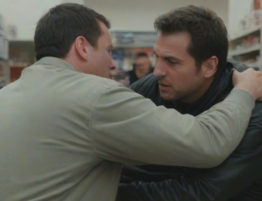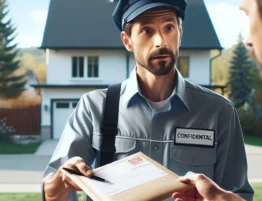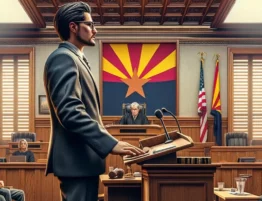Imagine walking home after a night out with friends, feeling the effects of alcohol but believing you’re behaving responsibly. Suddenly, you find yourself in an unexpected altercation that escalates quickly, drawing attention from bystanders and, ultimately, law enforcement.
This scenario is far too common and can lead to being charged with disorderly conduct, particularly when alcohol consumption impairs judgment and behavior. State law takes such incidents seriously, and the consequences can extend to a jail sentence, impacting your future significantly.
In situations like these, having a criminal defense lawyer can make a big difference. The Law Office of Daniel Hutto is experienced in helping people who face these kinds of charges. They offer clear legal advice and work hard to handle disorderly conduct cases effectively, with the goal of getting the best results for their clients.
Here’s what this article will cover:
- Is Drunk and Disorderly the Same as Drunk in Public?
- What Are Arizona’s Disorderly Conduct Laws
- Public Drunkenness Penalties
- Public Intoxication Defenses
- How a Criminal Defense Attorney Can Help
How an Arizona Criminal Defense Attorney Can Help
Our Phoenix Criminal Defense Attorneys are Here to Help!

Is Drunk and Disorderly the Same as Drunk in Public?
Understanding the distinction between “drunk and disorderly” and “drunk in public” is important under Arizona law, as the legal consequences and definitions differ.
Drunk in Public:
In Arizona, simply being drunk in a public space is not in itself a criminal offense.
The state does not specifically penalize public intoxication; individuals are legally allowed to be inebriated in public places without facing direct charges for the state of intoxication alone.
Example Scenario: John attends a late-night party in downtown Phoenix and consumes several alcoholic beverages. After leaving the party, he decides to walk home while visibly intoxicated but remains peaceful and does not engage with passersby. In this case, John is not violating any specific public intoxication laws in Arizona merely by being drunk in public.
Drunk and Disorderly:
Conversely, “drunk and disorderly” conduct refers to situations where an individual, while intoxicated, engages in behavior that disrupts public peace or order, fitting the criteria under ARS 13-2904 for disorderly conduct.
Example Scenario: Sarah leaves a bar in Tucson visibly intoxicated and starts shouting at other patrons and passersby, causing a scene. She then proceeds to knock over a street sign and challenges others to a fight. Despite being in a public place, Sarah’s actions escalate her situation from mere public intoxication to drunk and disorderly conduct due to her disruptive behavior.
What Are Arizona’s Disorderly Conduct Laws
Under Arizona law, specifically Arizona Revised Statutes (ARS) 13-2904, disorderly conduct is defined as intentionally or knowingly disturbing the peace and quiet of a neighborhood, family, or person. This statute aims to maintain public order and prevent behaviors that can lead to unrest or discomfort within communities.
Examples of Disorderly Conduct:
- Engaging in Fighting or Disruptive Behavior: This can include physical altercations, public brawls, or any aggressive conduct that threatens or disturbs others.
- Making Unreasonable Noise: Loud music, yelling, or other forms of loud behavior in inappropriate settings, especially during late hours, can be deemed disorderly conduct.
- Using Offensive Language or Gestures: Abusive or offensive language or gestures, particularly those that could provoke a reaction or altercation from others, fall under this category.
- Causing a Commotion to Prevent Business or Legal Proceedings: Actions intended to disrupt business operations, meetings, or legal gatherings can be charged as disorderly conduct.
- Refusing to Obey a Lawful Order to Disperse: In situations posing a threat to public safety, failing to comply with a police order to disperse can result in charges.
- Recklessly Handling, Displaying, or Discharging a Firearm or Deadly Weapon: This includes situations where a person recklessly uses a weapon in a manner that could disturb others.
Public Drunkenness Penalties
The severity of penalties depends on the nature of the offense and the individual’s criminal history. Disorderly conduct, for instance, is typically classified as a class 1 misdemeanor in Arizona, which can carry penalties including up to six months in jail, fines up to $2,500, plus surcharges, and probation.
Other charges associated with public drunkenness, like criminal nuisance or trespassing, also come with their own set of fines and potential jail time.
Public Intoxication Defenses
Although Arizona does not specifically criminalize public intoxication, individuals charged with related offenses such as disorderly conduct while intoxicated can employ several defenses. These defenses can help mitigate the situation or potentially lead to an acquittal, depending on the circumstances surrounding the case.
Lack of Intent to Disturb Peace:
One common defense is proving the lack of intent to disturb the peace or cause a public disturbance. This involves demonstrating that the individual’s behavior, although possibly influenced by alcohol, was not intended to be disruptive or did not inherently disturb public order.
Freedom of Speech:
Another defense might involve the First Amendment rights, particularly if the charges are based on what the accused said while intoxicated. This defense requires proving that the individual’s speech did not incite violence or constitute a clear and present danger, thus should be protected under free speech rights.
Insufficient Evidence:
A defense could also be based on the lack of sufficient evidence to prove beyond a reasonable doubt that the individual was acting in a disorderly manner due to intoxication. This might involve questioning the reliability of witness testimonies or the clarity of video footage.
Medical Conditions or Emergency:
Defendants can argue that their perceived intoxication or disruptive behavior was actually the result of a medical condition or an emergency situation. This defense would require medical documentation or other evidence to support the claim.
Voluntary or Involuntary Intoxication:
While voluntary intoxication is not typically a defense to disorderly conduct, arguing that the intoxication was involuntary (such as being unknowingly drugged) could be a viable defense, affecting the individual’s intent and awareness.
How a Criminal Defense Firm Can Help

If you’re facing charges related to public intoxication or disorderly conduct, a criminal defense attorney from the Law Office of Daniel Hutto can provide support.
They can evaluate your case, offer legal advice, and develop a defense strategy tailored to your situation. With their deep understanding of Arizona law, they can represent you effectively in court, negotiate with prosecutors, and handle all legal formalities and documentation. Their support extends beyond legal representation, offering guidance through every step of the legal process, ensuring you understand your rights and options.
To schedule a free initial consultation with the Law Office of Daniel Hutto, you can contact them at 602) 536-7878











